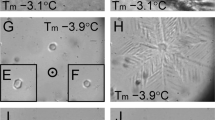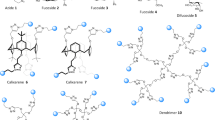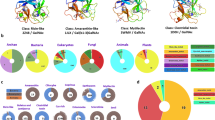Abstract
CERTAIN Antarctic fishes can resist freezing, even at ambient water temperatures as low as −1.9° C, partly because of the presence in their serum of a unique group of “antifreeze” glycoproteins1–5. These glycoproteins are composed of repeating units of the triglycopeptide, Ala-Ala-Thr-O-disaccharide. The disaccharide is galactosyl-N-acetylgalactosamine, with internal linkage β, 1→3 (ref. 6) or (β, 1→4 (ref. 7). Three active glyco-proteins differing only in polymer length have been characterized with molecular weights of approximately 11,000, 17,000, and 22,000. In addition to these active glycoproteins, two smaller related glycoproteins have been found. These differ from the large active glycoproteins by their comparative inactivity in depressing the freezing point, their smaller molecular weights (approximately 2,500 and 4,500), and the substitution of a proline for some of the alanines following threonine8,9.
This is a preview of subscription content, access via your institution
Access options
Subscribe to this journal
Receive 51 print issues and online access
$199.00 per year
only $3.90 per issue
Buy this article
- Purchase on Springer Link
- Instant access to full article PDF
Prices may be subject to local taxes which are calculated during checkout
Similar content being viewed by others
References
DeVries, A. L., Komatsu, S. K., and Feeney, R. E., J. Biol. Chem., 245, 2901 (1970).
Komatsu, S. K., DeVries, A. L., and Feeney, R. E., J. Biol. Chem., 245, 2909 (1970).
DeVries, A. L., Vandenheede, J., and Feeney, R. E., J. Biol. Chem., 246, 305 (1971).
DeVries, A. L., Science., 172, 1152 (1971).
Feeney, R. E., Vandenheede, J., and Osuga, D. T., and Osuga, D. T., Naturwissenschaften, 59, 22 (1972).
Vandenheede, J. R., Ahmed, A. I., and Feeney, R. E., J. Biol. Chem., 247, 1885 (1972).
Shier, W. T., Lin, Y., and DeVries, A. L., Biochim. Biophys. Acta, 263, 406 (1972).
Chan, S. M., thesis, Univ. California, Davis (1971).
Lin, Y., Duman, J. G., and DeVries, A. L., Biochem. Biophys. Res. Com., 46, 87 (1972).
Chuba, J. V., Kuhns, W. J., and Nigrelli, R. F., J. Immun., 101, 1 (1968).
Chuba, J. V., Kuhns, W. J., Nigrelli, R. F., Morris, R. A., and Friese, U. E., Haematologia, 4, 85 (1970).
Cawley, L. P., Jones, J. M., and Teresa, G. W., Transfusion, 7, 343 (1967).
Pardoe, G. I., Bird, G. W. G., Uhlenbruck, G., Sprenger, I., and Heggen, M., Z. Immun-Forsch., 140, 374 (1970).
Sprenger, I., Uhlenbruck, G., and Pardoe, G. I., Haematologia, 4, 373 (1970).
Drysdale, R. G., Herrick, P. R., and Franks, D., Vox Sang., 15, 194 (1968).
Feeney, R. E., Ahmed, A. I., and Osuga, D. T., Fed. Proc. (in the press).
Author information
Authors and Affiliations
Rights and permissions
About this article
Cite this article
CHUBA, J., KUHNS, W., NIGRELLI, R. et al. Inhibition of Lectins by Antifreeze Glycoproteins from an Antarctic Fish. Nature 242, 342–343 (1973). https://doi.org/10.1038/242342a0
Received:
Issue Date:
DOI: https://doi.org/10.1038/242342a0
This article is cited by
Comments
By submitting a comment you agree to abide by our Terms and Community Guidelines. If you find something abusive or that does not comply with our terms or guidelines please flag it as inappropriate.



